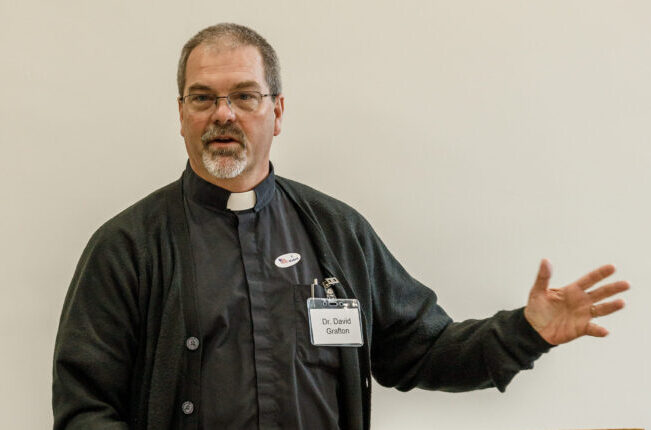
photo credit: Aaron Joseph
Reverend Doctor David Grafton begins a lecture about burial practices in the modern era with two anecdotes, both designed to convey similar points: times are changing.
In one anecdote, a funeral director laments the waning religiosity of funeral services, noting that many families opt for the quickest and cheapest service possible. In the other, Rev. Dr. Grafton is compelled by his spiritual training to commandeer his sister-in-law’s funeral service, which was left bereft of a spiritual component desired by his departed relative.
Both stories share a theme of funeral services and burial practices becoming increasingly secularized, which raises concerns for religious-minded families who wish to offer traditional burials for their loved ones in a world that is heading in a direction that does not value tradition.
Rev. Dr. Grafton chooses to focus on the Muslim burial experience in America to best explain this conundrum. He explains in his presentation that Muslims adhere to very traditional and specific procedures when a loved one dies. The decedent’s death and burial should take place with minimal time in between, as it is important for the recently-deceased to begin their journey to the afterlife and meet their reckoning as soon as possible. When a body is deceased, a loved one will have to find a mortuary where they can take the body to be undressed and washed from head to toe numerous times, per tradition. The body will not be embalmed. This poses a problem for Muslims, as finding facilities to accommodate this practice is difficult due to concerns over sanitization. Muslims face an additional problem when it comes to the actual burial, as they do not use caskets, but bury their dead in bound shrouds, generally three feet down, and facing mecca. In some states, there are legal actions about bodies being embalmed and contained for burial.
“Dominant cultural perspective” is what Rev. Dr. Grafton credits with getting in the way of religious tradition in the current era. As he explains, regardless of your particular religious tradition, there is always a dominant cultural perspective that invades that space. This could be an opportunity to preach or address religious matters with the uninitiated, but that is something that should be met with sensitivity to those who may be greatly confused by your traditions.
One of the dominant cultural perspectives that currently disrupts burial practices is the all-pervasive concern for the environment and “going green.” Muslims assert that their burials are eco-friendly as they do not embalm, yet they also do not believe in cremation, which is considered to be more environmentally-friendly than burial. To alleviate some of the strain on Muslim burial practices in America, some Muslim communities are buying cemeteries where they will be freer to bury according to their tradition. In addition to the practical conveniences of having your own community cemetery, there is intrinsic worth as well, as having a cemetery distinguishes your community as a fixture in your area.
This presentation is part of an ongoing series hosted by Rev. Michael Dolan, Director of Interreligious Affairs for the Archdiocese of Hartford, and Pastor of Our Lady of Mount Carmel Parish, Hamden.
Rev. Dr. David D. Grafton is a Professor of Islamic Studies and Christian-Muslim Relations on the faculty of the Duncan Black Macdonald Center for the Study of Islam and Christian-Muslim Relations at Hartford Seminary. He is a pastor of the Evangelical Lutheran Church in America, and has served Lutheran congregations in New Jersey, England, and an international congregation in Cairo, Egypt.
